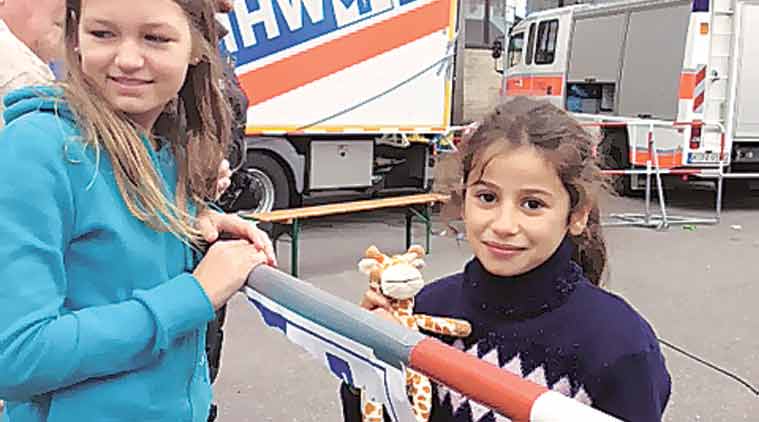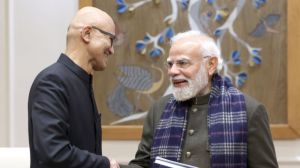She gets the baby giraffe.
As Hela steps inside a barricaded enclosure at the Munich railway station, Sandra Huber dips into a large bag full of stuffed toys and picks out the little giraffe for her. Both of them — Hela (9) is from Kobani in Syria and Sandra (12) from Munich — seem aware of the import of the gesture.

“Our children have enough and more to give away to these kids who have suddenly arrived in our country,” says Sandra’s mother.
Till noon, volunteers have counted 6,000 refugees who have arrived at the station. Hela speaks a smattering of English, appears resolute for her age and says that it took her group, including two of her brothers and relatives, 10 days to reach Germany via Hungary. “I miss my home. I miss my parents too, but I want to study here and learn the German language,” says Hela.
[related-post]
There are many such scenes at the station. Syrian children are quickly wrapped in white plastic sheets to keep them warm. Sandra leans across the barricade to hand over the rest of her toys. There are more being handed out by Coralie Wenger, a photographer from Schaffhausen in Switzerland, who took a train to Munich with her grandmother and two children to greet the refugees. Her three-year-old daughter is holding a bag with a pair of sneakers which she wants to hang on to for a few minutes more. “She will give the shoes, I know she will,” Coralie says.
The volunteers and police, meanwhile, separate the refugees in batches. Hela and her relatives are crowded into a tent and within minutes, asked to form a queue to board a waiting bus to one of the four camps in Munich. Hela is now wearing a black coat; she is smiling, clutching a large bottle of water and the baby giraffe. Perhaps, in an hour or so, she will get the coveted refugee registration number, just another among the thousands of fleeing Syrians who have managed to reach the Bavarian capital.
The warm welcome and farewell is just a beginning for the refugees and the Germans. For, it is now that the process of assimilation begins. With thousands of arrivals every day from Syria, as well as hundreds from Iraq and Afghanistan, the camps in Munich are overflowing. After being fed and clothed, the refugees are put on trains to be “re-distributed” to cities like Hanover and Dusseldorf and onwards to smaller cities and towns all over Germany.
Story continues below this ad
The volunteers, too, have been taken aback by the fresh wave of arrivals. Says Nawal Abawi, a Palestinian who is now assisting women and children on trains out of Munich: “Last weekend, we saw 7,000-8,000 arrivals. I have been living in Munich for 32 years and it is only now that I have seen the soul of this city.”
The gargantuan effort that is unfolding is evident at the Messe Munchen International, one of the world’s largest convention centres, which has seen its main exhibition halls converted into one giant holding arena for refugees.
Outside the Messe, Heba Masalme, 23, is returning to the Munich station to look for her husband. “Yesterday, while we escaped into Germany, my husband was arrested at the border by police in Hungary. Now, I am told he has been released so I am going to search for him,” says Heba.
Inside the Messe, there is ample evidence of German enterprise and generosity. Here, refugees are given hot meals at food counters and escorted to a clothing zone where jackets, shirts, pants, and endless rows of shoes and boots are neatly arranged, according to size. There are scores of cartons with toiletries, towels and diapers. In one corner, an Internet and wi-fi counter has sprung up. In another section, a makeshift play area has been rigged up, with volunteers helping toddlers on a spiral slide, while some German teenagers keep older children engaged with face-painting sessions.
Story continues below this ad
Even in the few hours they spend at the Messe, the refugees are clear about what they want: schooling for children and employment for adults.
Hami Alsheikh, dressed in winter gear, says he escaped the civil war in Aleppo with just his engineering degree and a phone charger. “Many German companies have said they are willing to hire qualified Syrian engineers. That is what I am waiting for,” says Alsheikh, adding that it took him three weeks to reach Munich.
Says Ahmed Makhmood, a carpenter from Aleppo: “I left Syria because I just could not bear the war any more. I want to work here so I can earn enough to bring the rest of my family to Germany.”
With gigantic holding areas like the Messe filling up, indoor sport complexes and gymnasiums in smaller German towns are now being converted into refugee camps. It’s in these smaller towns that the real impact of taking in 800,000 refugees in a year may be felt.
Story continues below this ad
A local teacher says that with the next school session beginning this week, there is a hunt for Arabic-speaking teachers; 100 classrooms have been readied where the children of refugees will be put through a special curriculum over the next two years, including classes in German.
If there are apprehensions about a changing demographic structure that the influx might bring, few are voicing it now.
Says the owner of a souvenir store in central Munich: “We only fear that radical elements may have entered our city along with genuine refugees. And those who are genuine, too, will have to learn the rules according to which we live here.’’

 Munich resident Sandra hands over a toy giraffe to 9-year-old Hela from Kobani. (Express Photo by: Ritu Sarin)
Munich resident Sandra hands over a toy giraffe to 9-year-old Hela from Kobani. (Express Photo by: Ritu Sarin)






























